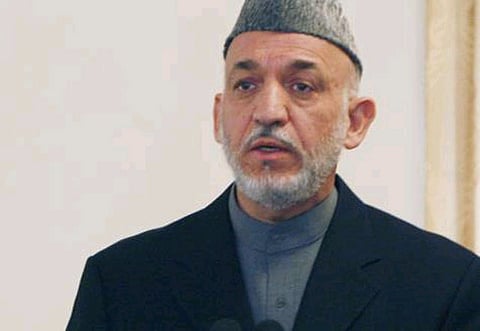US still needs Karzai
Better the devil you know when it comes to formulating strategy on Afghanistan

George W. Bush was an all-or-nothing sort of guy. He either loved you — or he really hated you. The former US president's top bogeymen included Saddam Hussain, North Korea's Kim Jong-il and Jacques Chirac. His pet favourites included Pak-istan's Pervez Musharraf, Tony Blair and Afghanistan's President Hamid Karzai.
In Afghanistan, as elsewhere, Bush's amours are Barack Obama's heartaches. Unlike his predecessor, Obama is not deaf to doubts about Karzai, expressed by top officials like US ambassador Karl Eikenberry, who warned he was "not an adequate strategic partner". With little love lost on either side, Obama's insultingly brief, first presidential visit to Kabul on March 29, under cover of darkness, was a wholly predictable disaster.
Obama was in his most condescending, holier-than-thou professorial mode — an attitude that would irritate a saint, let alone an under-pressure politician. He lectured Karzai on the need to entrench good governance, extirpate corruption, eliminate the narco-barons and hold free, fair parliamentary elections in September. Then, refusing a joint appearance, he left.
Karzai's subsequent ranting against the West in general and the US in particular is not unconnected to this clumsily managed encounter. But it also cannot be separated from repeated American arm-twisting and name-calling dating back to last autumn, when Obama, Vice-President Joe Biden and a host of other US political leaders lambasted him for manipulating the presidential polls. Each time he has been shoved, Karzai has shoved back harder.
Thus when Obama withdrew an earlier invitation to the White House, Karzai responded by hosting a visit to Kabul in March of Washington's latest bete noire, President Mahmoud Ahmadinejad of Iran. He may have intended it as a reminder that, when it comes to friends, Afghanistan has other options. Recently, the US reported detecting a "significant shipment of weapons from Iran into Kandahar", the scene of the coming, possibly climactic battle of the Afghan war. A coincidence? Or cynical double-dealing?
Shortly after Obama left Kabul, US media quoted unidentified senior officials saying Karzai's half-brother, Ahmad Wali Karzai, head of Kandahar's provincial council, should have his name added to a "kill" list.
Legitimate and necessary
Author Steve Coll, writing in the New Yorker from Kandahar, argues that the removal of Ahmad Wali Karzai (or AWK, as he is known) is both legitimate and necessary if the coming Kandahar offensive is to succeed.
As the US commander General Stanley McChrystal has acknowledged, military action will not work without an accompanying political strategy.
"Whatever the courtroom-ready evidence against him, there is no question but that AWK is the most visible, most intractable symbol of corruption and corporate self-interest of the Karzai government in southern Afghanistan …" Coll wrote. The coalition's political strategy in the south was already "timid, improvised and compromised". AWK's continued presence might ensure its ultimate failure.
Whatever the truth of this contention, the Kandahar coup isn't going to happen. McChrystal has reportedly decided, after a typical Obama-esque lengthy debate, that it's better to deal with the devil you know than the devil you don't.
The US needs Karzai because current alternatives are worse or unworkable. It needs him because Obama dare not risk his 30,000-man surge and the crucial effort to hand off security to an enhanced Afghan military and police apparatus. It needs him because it wants reasonably clean elections this autumn and a decent run at institution-building. It needs Karzai because, eventually, the US will agree to multilateral talks with Taliban elements and Karzai is already negotiating with some of them and with Pakistan.
Obama needs Karzai because, in not much more than a year, he intends to declare a sort-of victory in Afghanistan, like the sort-of victory in Iraq, and start bringing the troops home. More than that, Karzai will remain because, as Karzai himself cannily calculates, Afghans historically want a leader who is prepared, on occasion, to stand up and fight for their sovereign rights — and to take on the big foreign powers.
Sign up for the Daily Briefing
Get the latest news and updates straight to your inbox


